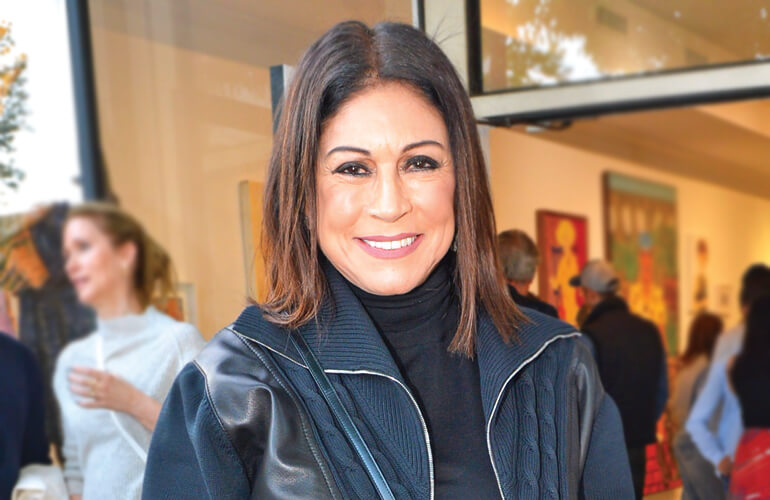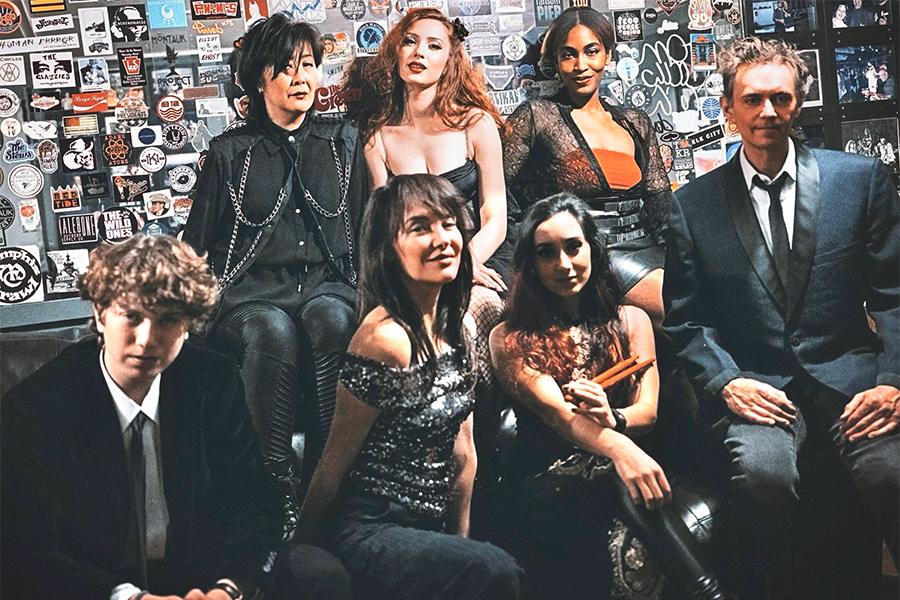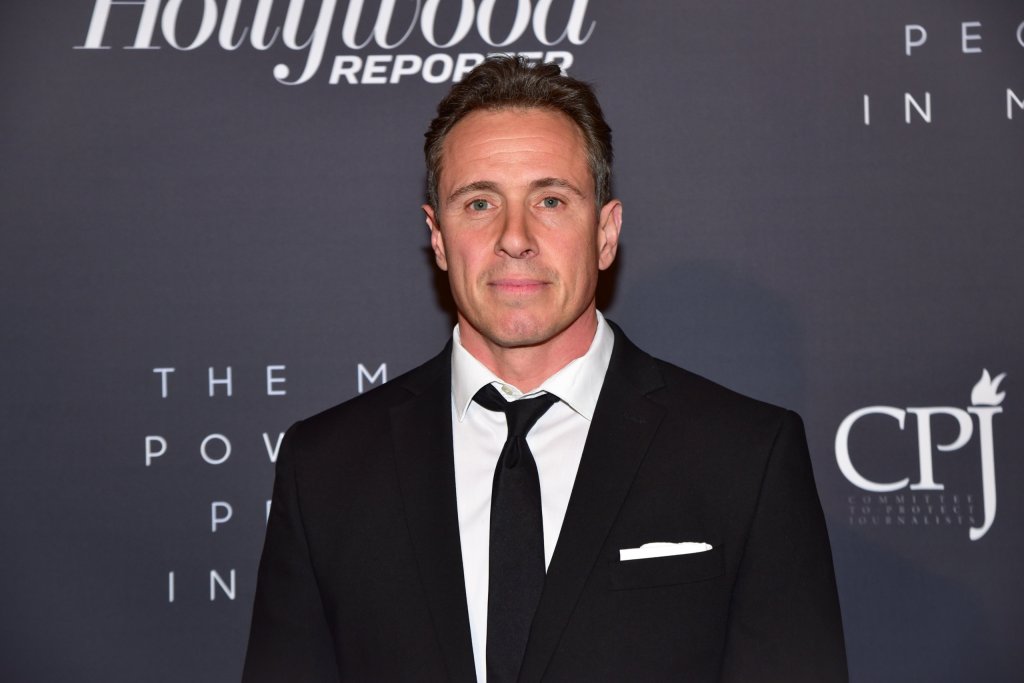Caroline Hirsch, Water Mill's Doyenne of Standup, Celebrates 20th NY Comedy Festival

Caroline Hirsch may not be a household name outside of her native New York City. But in the world of standup comedy, the Water Mill homeowner is a towering figure.
Put aside the four decades she spent owning and operating the comedy club that bore her name, which arguably became New York’s most well-known venue for standup acts. Hirsch is also celebrating the 20th anniversary of the New York Comedy Festival, which she launched in 2004 and still produces today.
Tickets are already on sale for this year’s festival, which runs from November 8-17. Featured headliners include Judd Apatow, Dave Attell, Bill Maher, Tracy Morgan, JB Smoove and many other bold-faced names and burgeoning stars.
Over its 20-year history, the festival performer list is as glitzy as it gets. It includes names like Roseanne Barr, Bill Burr, Louis C.K., Dane Cook, Billy Crystal, Larry David, Jim Gaffigan, Ricky Gervais, Kevin Hart, Denis Leary, Norm Macdonald, Marc Maron, Patton Oswalt, Amy Schumer, Sarah Silverman, Marlon and Shawn Wayans, Robin Williams, Steven Wright and many more.
“I think what I like best about the Festival is that it’s this puzzle that always comes together,” Hirsch says. “We announced about 21 big theatrical shows this year, but we’re working on a number of smaller shows around the city in all five boroughs. It will be close to 300 shows with way more than 200 comedians. When it all comes together, we say, ‘Wow, this is a good festival.’”
She may not have known it at the time, but Hirsch’s career path was all but carved in stone years before she and two friends opened the first incarnation of her eponymous New York City comedy cabaret in Chelsea in 1982.
In 1967, before she was old enough to drink in a club, she snuck into the Bitter End in Greenwich Village to catch a set by the legendary George Carlin.
Just as Marlon Brando dramatically influenced and affected a generation of actors that came after him, George Carlin brought about a sea change in the world of standup.
“I worked with all these people,” Hirsch says, singling out Jackie Mason, a very successful old-school act who had a second wave of popularity in his later years. “When Mason worked at Caroline’s I never laughed so hard — he was just so on time,” she observes. “But Carlin really was the changing point.”
“When Carlin started doing observational humor, it wasn’t like there was the set-up and then the joke — there was no ‘take my wife, please.’ When Carlin started discussing things that we all related to at that time — whether it was the Vietnam War or another contemporary topic — that was a mark in the culture of comedy that changed things.”
Interestingly, Judd Apatow, one of this year’s New York Comedy Festival headliners, shares something of a similar backstory with Hirsch. When he was only a teenager, long before he became a superstar writer/director, Apatow snuck into Carolines in Chelsea, masquerading as a reporter. Somehow, he managed to score an interview with Paul Reubens (aka, Pee-wee Herman).
Of course, Reubens never had the effect George Carlin did on the comedy landscape. But Pee- wee’s persona — particularly his landmark television show and feature films in the early- and mid-1980s, were wildly inventive and extremely influential at the time.
In the early-80s, standup comedy was enjoying something of a golden age — and Caroline’s Chelsea club showcased then barely-known talents, many of whom went on to become the biggest names in the industry. In addition to Reubens, early performers on the Chelsea stage included Jay Leno, Jerry Seinfeld, Sandra Bernhard, Billy Crystal, Robin Williams and later, Chris Rock.
Cut to 1987. After having operated the Chelsea location for five years, Caroline moved the club to the South Street Seaport, where it evolved from a small cabaret into a full-fledged nightclub. During the Seaport days, Caroline also created and executive-produced Carolines Comedy Hour, which featured both household names and up-and-coming acts. Ultimately, the show aired 120 episodes on the A&E Network and garnered a Cable ACE award for Best Standup Comedy Series.
In 1992, Caroline moved her club to Broadway and 49th Street, when Times Square was still more than a little rough around the edges. City officials credit the club with playing an integral part in the revitalization of the area. The Times Square club (aka Carolines on Broadway) soon established itself as one of the country’s top breeding grounds for new and emerging talent.
Carolines on Broadway closed its doors in 2022, but Caroline Hirsch has kept as active as ever, producing the New York Comedy Festival and a host of other events, including numerous charity benefits. In fact, Hirsch has received a bevy of awards and honors for her philanthropic work.
She has been honored with the New York Police Athletic League’s Woman of the Year Award, the Ms. Foundation’s Philanthropic Vision Award and the National Association of Women Business Owners’ Signature Award for Lifetime Achievement. Additionally, Caroline was honored by the National Coalition Against Censorship for her unwavering support of free expression and artistic freedom through comedy at NCAC’s annual Celebration of Free Speech and Its Defenders.
In January 2018, Caroline was honored by Variety at its inaugural Salute to Service event, which celebrates the notable efforts and contributions by individuals shining a light on military services and organizations through their courageous, humanitarian and philanthropic efforts.
And at a press conference at the Hard Rock Hotel announcing the 2022 New York Comedy Festival, New York City Mayor Eric Adams issued an official proclamation citing August 16, 2022, as “Caroline Hirsch Day” in New York City.
A longtime summer resident of Water Mill, these days Hirsch spends more time in her vacation home during the offseason than she used to.
“I’ve been out here for 40 years, and I’ve watched everything grow and grow,” she says, summing up the thoughts of many East End homeowners. “As you drive out on 27 and come through Hampton Bays and pass the Shinnecock Canal, it’s almost like there’s this moment where you go ‘ahh.’ There’s something so peaceful about it. There was always this sense of calmness out here.”



